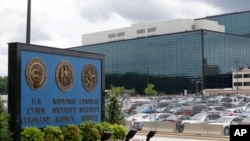With U.S. senators no closer to reauthorizing the government's domestic surveillance program, the White House is sounding new warnings that the safety and security of Americans is being put at risk.
White House spokesman Josh Earnest Friday accused the Senate of "playing chicken" with the program, part of the Patriot Act passed after the attacks of September 11, 2001. The Patriot Act expires June 1 and allows the National Security Agency to collect the phone records of U.S. citizens as part of its effort to uncover terrorist plots and prevent potential attacks.
Earnest warned that unless the Senate votes to reauthorize the program by the end of Friday, the NSA would have to begin shutting it down.
"The kinds of programs we're talking about here are not the kinds of programs that can be started and stopped with the flip of a switch. It requires time," he said. "Even only a little risk is something we don't need to subject ourselves to."
The administration of President Barack Obama is pushing the Senate to pass a compromise measure already approved by the House of Representatives. Called the USA Freedom Act, it would keep phone records in the hands of telecommunications companies unless the NSA obtains a court order to review them.
Earnest said the measure was crafted with "significant input" from the U.S. intelligence community and gives officials "the authority they need to keep us safe while ensuring the privacy rights of the American people are protected."
So far, that path is ruled out by the Senate’s Republican leadership, which favors reauthorizing the existing program. Key senators have crafted a stop-gap measure that would extend the government’s snooping capabilities for a two-month period.
“I hope that, because of the seriousness of the issue, we will get some period of time to be able to take an alternative to the floor and to have a real debate and a real chance for members to put [forward] their amendments to it,” said Senator Richard Burr (R-NC), chairman of the Intelligence Committee.
The White House calls such an approach unworkable because House lawmakers have already adjourned for a week-long recess and would be unavailable to vote on any new measures until after the surveillance program has already expired.
"It puts at risk the ability of our national security professionals to keep us safe," Earnest said. "There is no plan B."
The NSA's collection of bulk telephone data has been a hot-button issue for many Americans, some of whom believe it allows the government to probe too deeply into their personal lives.
Both the White House and the intelligence community have acknowledged those concerns and argue they are being addressed adequately.
"We have got to create a framework for this program that enables it to generate its capabilities and insights to let us defend the nation," NSA Director, Admiral Michael Rogers said at an appearance earlier this month. "But we've got to do it in a way that ensures the privacy of our citizens and engenders greater confidence in the nation."
Still, he argued even with appropriate restrictions, the government would need "timely access" to the data.
“If we are going to generate outcomes in a process that takes weeks and months it doesn't really generate the kind of value we need,” Rogers said.
The NSA program was recently ruled illegal by a federal appeals court, and its constitutionality ultimately could be decided by the Supreme Court unless Congress acts to reform it.
The White House wants the government’s bulk collection of phone data ended, but does not want information to disappear entirely.




